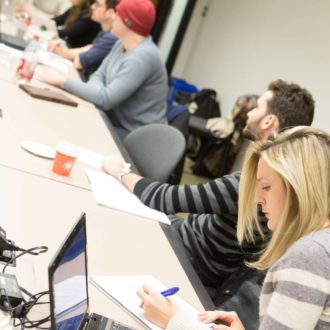The research process comes full circle — less than a year after finishing my Woodrow Wilson School task force as a junior writing a Junior Paper, I’m now serving as a Senior Commissioner for a task force about federal policy and poverty reduction in the United States. The job of the Senior Commissioner is to help lead class discussions, to assist juniors in the research process, and to collate everyone’s junior papers into a final briefing book at the end of the semester. Having been through the whole task force process before, it gives me a unique perspective to help guide juniors through their first steps into independent work.

For those who aren’t familiar with the Woodrow Wilson School course of study, every junior in the department completes a task force as part of their independent work requirement. You write a case study about a given policy issue, and at the end of the semester, you’ll present it to policy stakeholders. There are few other places in the world where you can sit as an undergraduate on the same level as major policymakers. In other words, this is super cool.
Last spring semester, my task force presented at the United Nations to the United States Mission to the U.N., as well as to the Under-Secretary-General for Political Affairs Jeffrey Feltman. I presented my Junior Paper about the pre-conflict situation and diplomacy in the contemporary South China Sea territorial disputes. And now, my task force will devise policy solutions for major poverty and inequality issues in the United States. We’ll be presenting to either state policymakers or policymakers in Washington, D.C. at the end of the semester. This is one of the best parts of the Wilson School, in my opinion.
Working as a Senior Commissioner is fascinating for me because it allows me to think back on how exactly I put together my first Junior Paper (JP) in my junior policy research seminar a year ago. As the juniors in my task force set out to write their own JPs, my fellow commissioner Diego Negron-Reichard and I have been trying to use what we learned from our own JPs to play an active role in guiding that process for others.
Every member had a policy issue they were interested in researching, but few had an actual research question that had arisen from their topic. For example, lots of students wanted to research housing policy, but few had developed a specific angle from which to tackle that broader policy issue. Diego and I gave feedback to everyone in the class, reminding our classmates of the feasibility of their topics. One person wanted to tackle the entire U.S. tax code’s effect on poverty — probably too large of a project for a junior paper, we said.
And that’s okay – coming up with a feasible and relevant research questions is difficult. That said, I was confident that everyone would be able to formulate a question later in the process. I’m constantly reminded of a reading from my junior policy seminar about the process of going “from topics to questions.” It seems overwhelming at first to be confronted with a massive research topic, but only by steadily winnowing down the scope of the project can you eventually arrive at a question.
As for my part in this? Through the collaborative process, and drawing from my own experiences, hopefully I’ll be able to help shepherd the juniors in this task force through their very first junior paper. I still remember struggling in my task force to move from a broad topic (conflict and diplomacy) to a specific research question. It really made me think hard about the regions and conflicts I wanted to study. I can’t even remember how many different questions and regions I moved through before finally settling on the South China Sea for my task force paper.
So, remembering this whole process was very helpful in guiding juniors through their topic formulation process. It gave me the perspective to help guide juniors from an overly broad topic (the entire U.S. tax code) to something more specific — perhaps the efficacy of the Earned Income Tax Credit (EITC) on reducing poverty rates in American cities.
The junior paper was scary for me at the time, but looking back a year later, the junior paper was perhaps the best preparation for the thesis that I could have received.
–Nicholas Wu, Social Sciences Correspondent

